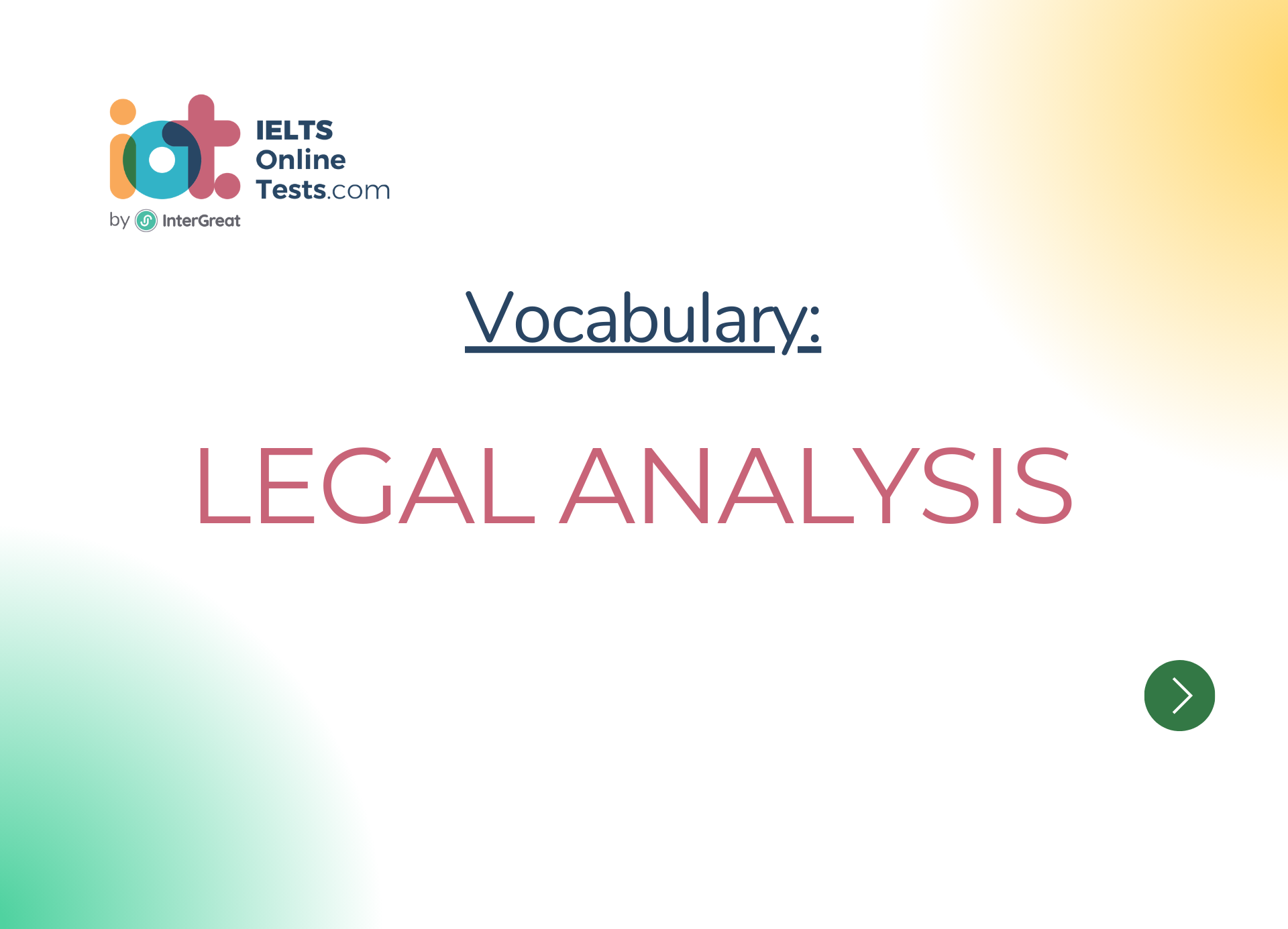
Legal analysis
Below is a comprehensive list of vocabulary related to "Legal Analysis," which will help you discuss the process of examining and interpreting legal information and principles in English, suitable for the IELTS band score range of 6.5-8.0:
Statute:
Definition: A written law passed by a legislative body.
Example: The legal analysis involves interpreting relevant statutes to determine their applicability to the case.
Case law:
Definition: The collection of legal principles established by judicial decisions in past cases.
Example: The legal analysis relies on both statutes and case law to establish precedents.
Precedent:
Definition: A previous legal decision or judgment that serves as an authoritative example for future cases.
Example: The legal analysis involves identifying relevant precedents to guide the current case's outcome.
Legal doctrine:
Definition: A principle or body of principles that form the basis of a legal system or interpretation.
Example: The legal analysis requires understanding the underlying legal doctrines relevant to the case.
Legal framework:
Definition: The structure and organization of laws and regulations within a jurisdiction.
Example: The legal analysis involves evaluating the case within the existing legal framework.
Interpretation:
Definition: The act of explaining or understanding the meaning of legal provisions or documents.
Example: The legal analysis requires careful interpretation of the contract's terms.
Ambiguity:
Definition: The presence of multiple possible meanings in legal language or provisions.
Example: The legal analysis addresses the ambiguity in the statute to ascertain legislative intent.
Prima facie:
Definition: Latin term meaning "on its face" or "at first sight," used to describe evidence that appears sufficient to prove a fact.
Example: The legal analysis establishes a prima facie case for the plaintiff's claim.
Burden of proof:
Definition: The obligation to present sufficient evidence to persuade the court or jury of a claim's validity.
Example: The legal analysis assesses whether the plaintiff has met the burden of proof.
Counterargument:
Definition: An opposing argument or viewpoint presented to challenge a legal position.
Example: The legal analysis addresses the counterarguments raised by the opposing party.
Jurisdiction:
Definition: The authority of a court or legal body to hear and decide a case.
Example: The legal analysis examines whether the court has proper jurisdiction over the matter.
Remedy:
Definition: The solution or relief sought or granted in a legal proceeding.
Example: The legal analysis considers the appropriate remedies available to the parties.
Stare decisis:
Definition: Latin term meaning "to stand by things decided," referring to the principle of adhering to precedents.
Example: The legal analysis discusses the doctrine of stare decisis in determining the case's outcome.
Judicial review:
Definition: The power of a court to examine and potentially invalidate governmental actions that violate constitutional principles.
Example: The legal analysis involves evaluating the validity of administrative decisions through judicial review.
Due diligence:
Definition: A thorough and careful investigation or research to support legal decision-making.
Example: The legal analysis requires conducting due diligence to assess potential risks.
De jure:
Definition: Latin term meaning "by law," used to describe something that exists legally.
Example: The legal analysis determines whether the entity is a de jure corporation.
Ultra vires:
Definition: Latin term meaning "beyond the powers," referring to actions outside the scope of legal authority.
Example: The legal analysis examines whether the corporation acted ultra vires in a particular transaction.
Injunction:
Definition: A court order that restrains a person or entity from performing certain actions.
Example: The legal analysis assesses the grounds for granting or denying an injunction.
Doctrine of laches:
Definition: The legal principle that prevents a party from bringing a claim due to an unreasonable delay.
Example: The legal analysis considers whether the plaintiff's claim is barred by the doctrine of laches.
Dissenting opinion:
Definition: A written opinion by a judge or justice who disagrees with the majority's decision.
Example: The legal analysis examines the persuasive value of the dissenting opinion in subsequent cases.
By studying and incorporating these legal analysis-related terms into your discussions or writing, you can demonstrate a strong grasp of advanced academic vocabulary and enhance your communication skills for achieving a higher band score in the IELTS exam. Good luck with your studies!




